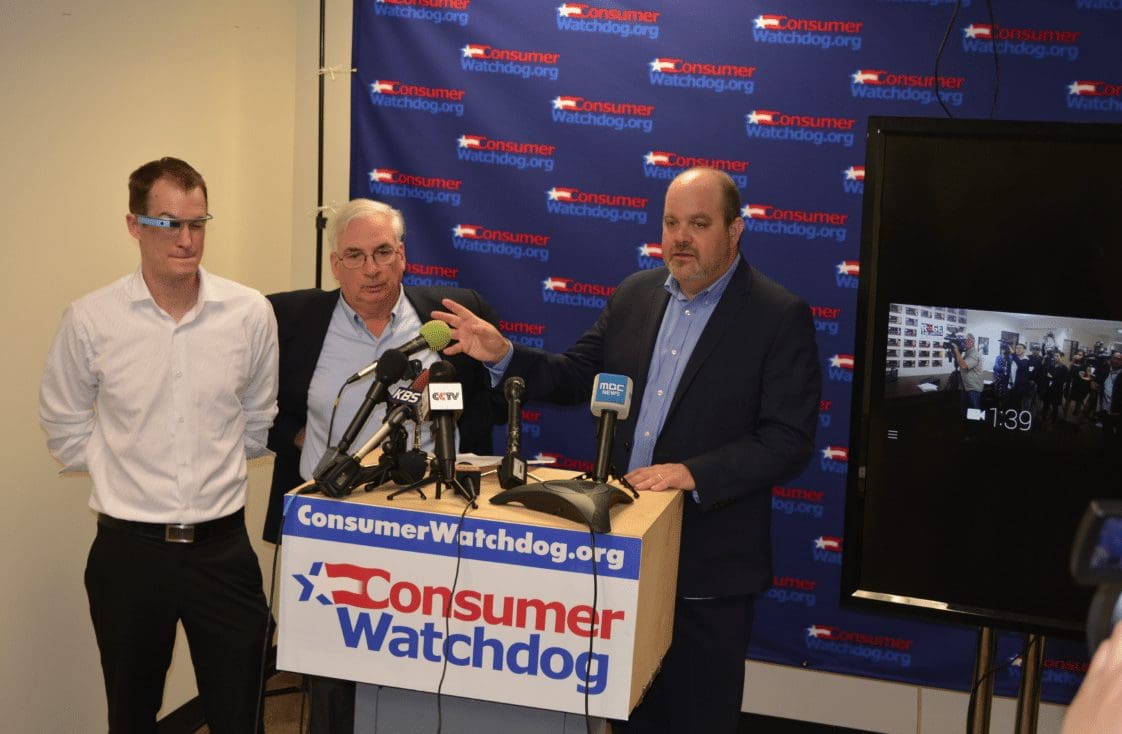
SANTA MONICA, CA – Consumer Watchdog today released a report detailing the privacy invasive features and potential harms of Google Glass, the Internet giant’s wearable computing device and offered a list of the top ten reasons not to be a “Glasshole.”
The report can be read at: www.consumerwatchdog.org/resources/goolgeglassreport041414.pdf
Consumer Watchdog has been testing a Google Glass device for weeks and warns that neither the user nor the subjects’ privacy is safe. Consumer Watchdog published the following Top 10 list to summarize its
concerns:
10. You cannot drive with a television on your head.
9. Why pay $1500 to let a corporation hack your eyes?
8. Say goodbye to using public bathrooms.
7. No one’s ATM PIN will ever be safe again.
6. Google says it hurts your eyes and gives you headaches.
5. Guess what happens to people who videotape children?
4. How long do you think your friends will hang around?
3. You look stupid.
2. Stalking isn’t cool.
1. Your life is too precious for Google to own.
Consumer Watchdog’s testing raised serious concerns about personal safety, health and privacy. Google Glass allows surreptitious video and photos to be taken that can violate the privacy of subjects as well as users. The nonprofit, nonpartisan group found that Google’s terms of service allow it to use all photos, videos and other content uploaded to Google Glass for virtually whatever purpose it wants. In other words, images can be used to identify you, your friends, your family and others for advertising, promoting the service or any other purpose Google sees fit.
“Google Glass threatens the privacy of both people whose images are captured unbeknownst to them and the user of the device. It can distract the user at critical moments, perhaps when driving, posing a safety hazard,” said John M. Simpson, Consumer Watchdog Privacy Project Director. “A consumer’s ATM pin number can easily be seen by a Glass user without the consumer’s knowledge. Google Glass can easily be used for improper and even criminal purposes.”
Google Glass’s visual display takes up about 15 percent of the visual field, obviously providing a distraction to a driver who wears them, Consumer Watchdog said. Nonetheless, Google has been lobbying against bills that would ban the use of Glass while driving.
In its Glass FAQs (https://support.google.com/glass/answer/3064131?hl=en) the Internet giant acknowledges that wearing Glass can cause headaches and eyestrain and cautions that people who have had Lasik surgery should consult with their doctor before donning Google Glass. It also warns that children under 13 should not use the device because it may harm their developing vision. Consumer Watchdog’s testing shows the disorienting factors are significant, even for an average wearer.
At last year’s annual Google shareholder meeting CEO Larry Page claimed that entering a public restroom wearing Glass is no different than entering with a smart phone. This is a false analogy, Consumer Watchdog said. A person can tell when they are being video recorded by a smartphone. A Google class recording can be made without the subject noticing.
Google says that it doesn’t offer facial recognition software on Glass, but Consumer Watchdog’s research found that apps developers have already made facial recognition software for the device.
Google is offering to sell Google Glass to anyone in the U.S. for $1,500 for one day, Tuesday, April 15. Until now Google has sold about 10,000 to "Explorers," who had to apply to make the purchase. Today is the first time they have become generally available, but Google says the sale is only for Tuesday.
“Google Glass is fundamentally privacy invasive and poses threats to safety,” said Simpson. “Don’t buy Google Glass; don’t be a Glasshole.”
-30-
Visit our website at www.consumerwatchdog.org












